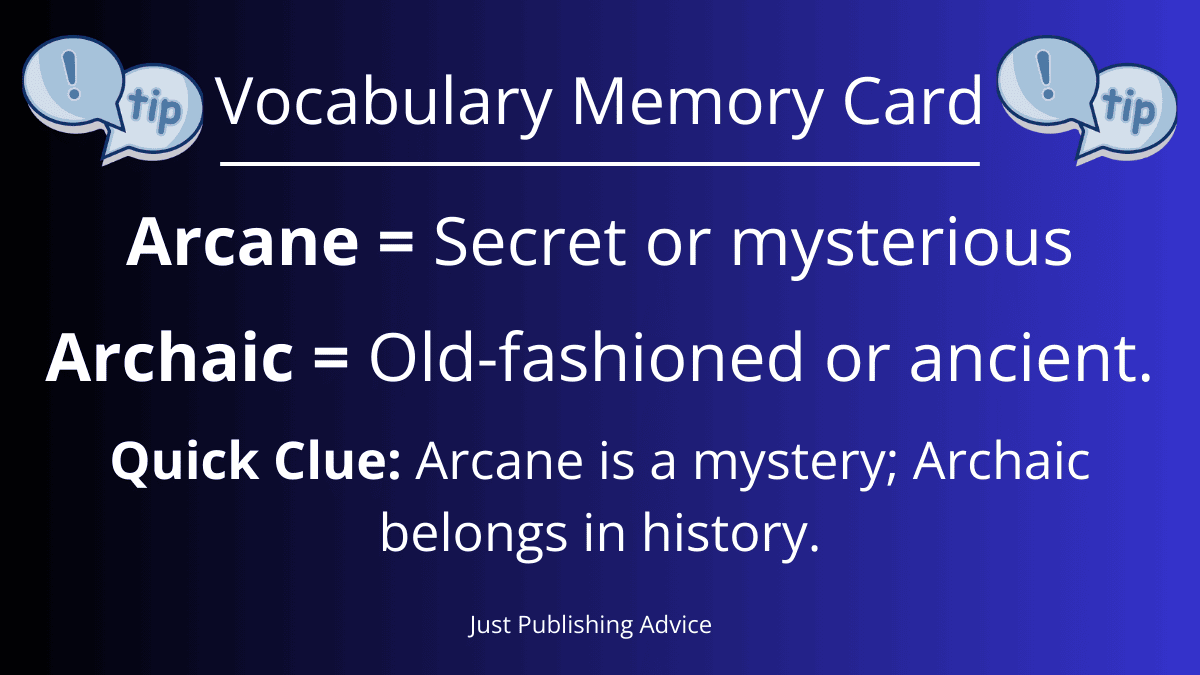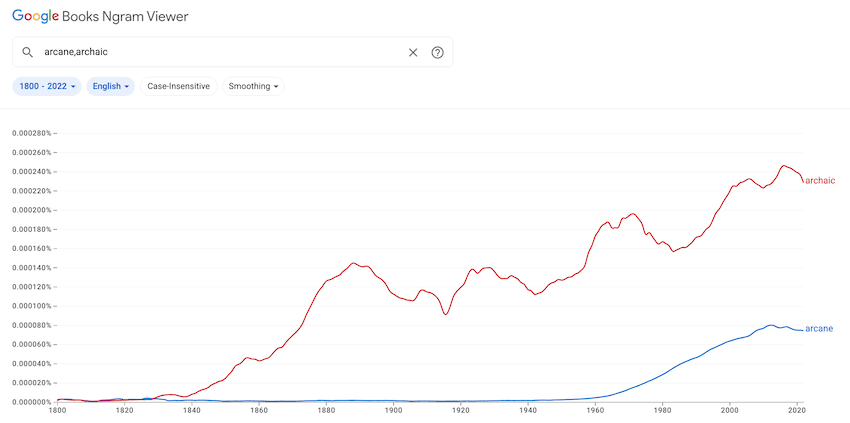
Is it arcane or archaic?
While both words describe things outside the mainstream, they aren’t interchangeable.
Use arcane for things that are mysterious or hidden (like complex tax laws or secret rituals).
Use archaic for things that are out of date (like dial-up internet or typewriter ribbons).
The difference between arcane and archaic

The meaning of arcane pertains to something that is mysterious, difficult to understand, or only known by a few. You might see it in texts describing practices, codes, or rules that are secret or at least complex.
Examples might be arcane rituals of a secret society, or arcane laws or procedures in a parliament.
Archaic is different because it simply means something is very old or outdated.
You often see it in dictionary definitions for words that are old and no longer in regular use.
For instance, you might see it describing archaic language in a book, or archaic laws that are no longer applicable.
The confusion stems from the two words overlapping, because both can apply to something old or ancient.
However, most of the time, you can reserve arcane for emphasizing obscurity or mystery, but use archaic when referring to age or outdated. It’s a fine distinction, but one that you should know if you want to use each word correctly.

Vocabulary is always a collecting game for writers, and this is simply another pair of confusing words to store away in your memory.
The two adjectives in use
Rather surprisingly, for two adjectives describing something old, these are relatively new words in common usage.
You can see from the Ngram graph below that archaic entered everyday use around 1850.
However, arcane didn’t make a regular appearance until around 1960.
I must admit that I found this surprising, as we often equate the two words.

The difference in timing might give some hints as to the roles of each word.
Archaic probably entered because of increasing interest in historical or old-fashioned practices, customs, or language.
However, arcane seems to have arrived much later due to writers wanting to describe and differentiate complex, mysterious, or specialized knowledge.
The distinction helps explain the examples I noticed in two news articles about confusing rules and procedures in the US Senate.
One article accurately described the Senate’s arcane procedures, highlighting their mystery, complexity, and obscurity.
The other, however, referred to archaic rules, emphasizing that some of the regulations or procedures were outdated.
Both words are always applicable to anything old.
But the context shows how each article conveyed a slightly different meaning or interpretation.
Hopefully, looking at the usage history and the context will help you remember the subtle difference in use for these two words.
Other word pairs that seem like synonyms, but aren’t
English has a lot of words that look or sound alike, and that we sometimes incorrectly assume are synonyms.
While some might be close in meaning, others can be surprisingly different.
Here are a few examples to show you why you need to be on your toes when using these words.
Disinterested vs. Uninterested
We use disinterested to convey a sense of someone being impartial or free from any self-interest or personal bias.
On the other hand, uninterested describes someone who lacks any interest or enthusiasm.
Make sure vs. Ensure
Ensure is usually more formal than make sure. But this is also a difference in meaning.
Make sure you buy some bread, which is informal and simply means don’t forget.
However, I will ensure your delivery arrives on time, is formal, and offers a guarantee.
Procrastinate vs. Prevaricate
To procrastinate means to delay or postpone an action or to put off doing something.
To prevaricate means to speak or act in an evasive way or to be deliberately misleading.
Usually vs. Normally
These two very common words are often misused, so it pays to check.
Normally refers to an action that is standard or normal or conforms to a set of rules.
However, the adverb usually describes or indicates frequency, habits, or personal tendencies.
Unkept vs. Unkempt
Yes, it’s only one letter, but it makes all the difference.
Unkept derives from the verb to keep.
If you think about phrases like to keep a promise, keep in good order, and keep house, the meaning is to maintain.
Unkempt derives from late Middle English: from un-‘not’ + kempt ‘combed’ (past participle of archaic kemb, related to comb).
So you could say that the word simply means uncombed.
You can see why you really need to be on the ball when you write. It’s so easy for word pairs like these to be used incorrectly.
Conclusion
Your words always matter, so taking a little extra care with words that look or sound similar is worth an extra few seconds of consideration.
Like using arcane instead of archaic, or confusing other word pairs, your choices can subtly change the meaning of what you write.
The best advice is to always be aware and never shy away from using your dictionary.
While you can collect a lot of writing knowledge and continually expand your vocabulary, you can’t know every word or subtle distinction.
That’s why you should always keep an eye open for tricky words, and ask yourself if you are using them correctly.
Readers notice, so any little slip-up can have a negative effect on what might be a wonderful piece of writing.
Should you keep a notebook of problem words you strike? Yes, you can.
However, once you encounter a problem pair and understand how they differ, your memory will probably be enough for the next time.
Related Reading: Obliged And Obligated Are Similar But Not Quite The Same
Share This Article


